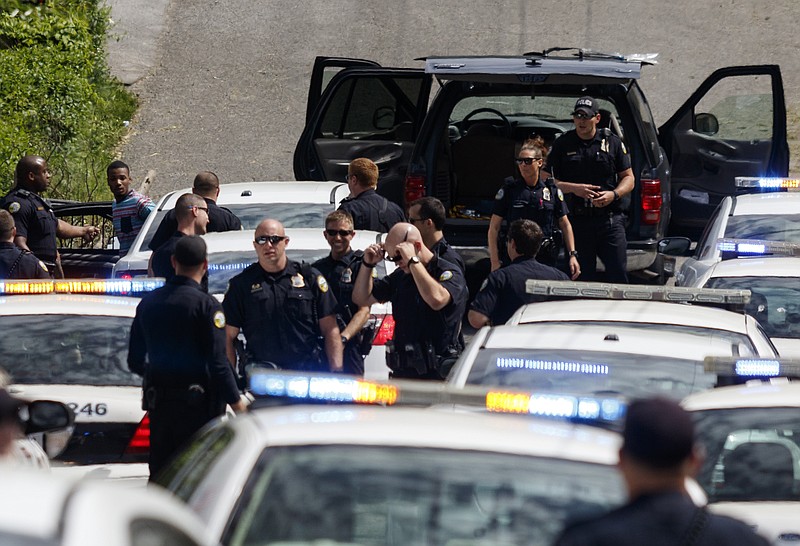Crime rates fell in East Lake Courts between 2016 and 2017, but that isn't enough evidence to justify a permanent "safety zone" that would fine 30-or-so alleged gang members for associating with each other, defense attorneys argued Tuesday.
During a roughly 45-minute trial in Hamilton County Criminal Court, attorney Chrissy Mincy argued prosecutors hadn't proven their case against the Grape Street Crips and Gangster Disciples: They didn't enter criminal convictions into evidence, didn't show how each man contributed to violence in East Lake, and mostly relied on gang validation forms to prove the men were a public nuisance.
Plus, attorneys said, nobody's been enforcing the "safety zone" since Hamilton County District Attorney General Neal Pinkston got a temporary version approved in December 2016. So can prosecutors link the falling crime rates to the safety zone?
"For those reasons I think [this case] should be dismissed," Mincy said.
The final decision maker is Hamilton County Criminal Court Judge Barry Steelman, who said he will issue a written order at a later date. Steelman has presided over the case since Pinkston filed a petition in September 2016 saying both gangs are a public nuisance in East Lake Courts.
At the time, Pinkston named 31 men and said he wanted a judge to approve a "safety zone" that would prohibit them from drinking beer, owning graffiti equipment, alerting others to the presence of police, using guns or drugs and hanging out with each other. Pinkston said the zone would give police officers another tool to stop routine troublemakers and said each man could be fined $50 or face up to 30 days in jail for violations.
Even if officers aren't enforcing it, Pinkston and other law enforcement said the injunction is sending a message. Throughout proceedings, only eight men have contested the safety zone, while the other 23 have not come to court, never been served, or stopped hanging around East Lake as much, law enforcement officials said.
"The word has gotten out over the past year, year and a half," said Felix Vess, chief of police for the Chattanooga Housing Authority, which has an office in East Lake Courts. "It's notified people they cannot be in the area, and everybody understood that and as you saw over the past year, crime got reduced in that area.
"When you look at the crime stats and the gang injunction, what else could it be?"
But defense attorneys say there are a few constitutional concerns with "safety zones," also known as "gang injunctions" in other cities.
First, telling someone where they can be and who they can be with is a violation of the First Amendment right to freedom of association, they argue. Second, the validation forms that prosecutors use to prove these men are gang members are based on hearsay. And third, there's virtually no way to come off the city's roughly 1,300-person gang database, they say.
Chattanooga officers use a point system to validate someone as a gang member. Tattoos, self-admittance and associating with other gang members are measured on a point system, and a person needs a certain number to be validated as a member.
Though defense attorneys believe validation forms are helpful intelligence on the street, they consider them hearsay in the courtroom: For instance, one officer could use information from another to compile a validation without verifying whether the initial information is still correct. It's why defense attorneys want to suppress them in this case, a request that Steelman also must rule on.
During Tuesday's trial, Mincy and other defense attorneys focused on the point system by questioning the state's one witness: Curtis Penney, a Chattanooga police officer who tracks gang intelligence.
"To your knowledge, no one's ever come off these gang validation forms other than death?" Mincy asked.
Penney said some members are purged from the department's gang validation spreadsheet if there's no information to support another gang validation.
"But as the five-year period is about to expire, you compile a new validation form on people, is that correct?" Mincy said.
"It's quite possible," Penney said.
Contact staff writer Zack Peterson at zpeterson@timesfreepress.com or 423-757-6347. Follow him on Twitter @zackpeterson918.
